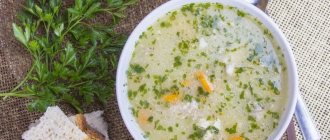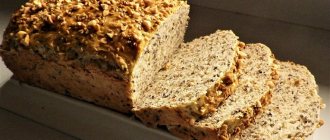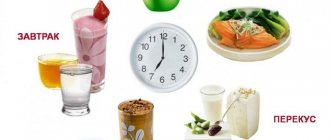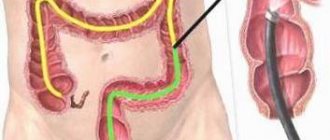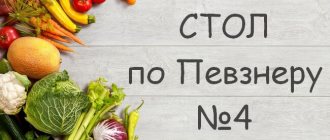Full text of the article:
With intestinal diseases, it is especially important to pay attention to nutrition. Intestinal diseases often cause a deficiency of nutrients in the body, as they disrupt the gastrointestinal tract and interfere with the absorption of nutrients. In addition to proteins and fats, the body may not receive enough vitamins and microelements that are necessary for normal functioning, so it is important to take care to avoid deficiencies. Proper nutrition helps with this.
Nutrition tips for exacerbation of gastrointestinal diseases
Doctors recommend that in case of exacerbation of gastrointestinal diseases, eat small meals, reduce portions, and divide all daily meals into 4-5 meals.
- Food and drinks should not be too hot, because... Rough and hot food causes damage to the mucous membrane of the stomach and intestines. It is not recommended to drink cold drinks or eat chilled food.
- Chew food thoroughly.
- Cooking options include boiled, stewed and steamed. Meat and fish dishes should be cooked without skin and fat.
- First courses with vegetable broth.
- To prepare dishes, choose poultry, veal, beef, pork - only lean parts; low-fat fish (carp, sea bass, dorado, pollock).
- Reduce the consumption of heavy animal fats, they create conditions for food to remain in the stomach for a long time. Promote the reflux of gastric contents into the esophagus.
- Table salt is limited to 4-5 g per day.
- Among the spices, marjoram, vegetable mixtures, cinnamon, turmeric, bay leaf, dill, parsley, cumin, and fennel are allowed.
- It is advisable to consume cereals well boiled or pureed.
- Bread is preferably white, dried or yesterday's baked bread.
- Desserts allowed include mousses, marshmallows, jelly, baked fruit, and marmalade.
- Cottage cheese in the form of casseroles, souffles, parfaits. It is preferable to use homemade yogurt and kefir without fruit additives or flavorings.
- Limit light carbohydrates (sugar, confectionery, sweet pastries, honey), fast food, drink enough water, drink a glass of warm water in the morning on an empty stomach.
- Temporarily exclude raw vegetables, hard-skinned fruits, and sour berries from your diet.
- Strong black tea, coffee, freshly squeezed juices, and sour fruit drinks are excluded. Herbal teas from chamomile, immortelle, rose hips, mint will help improve the process of digesting food; consult your doctor before use.
- Spicy, fried, salty, sour, smoked, and canned foods are excluded. It is also important to exclude nuts, pastry, alcohol, and carbonated drinks during dietary treatment.
Despite the restrictions, the diet can be tasty and varied.
Reviews and results
Diet for diseases of the gastrointestinal tract, according to the overwhelming number of patients, is the most important element of treatment, both during exacerbation and during remission. According to reviews, therapeutic nutrition does not cause negative attitudes, has a beneficial effect on the gastrointestinal tract and is easily tolerated over a long period of time.
- “... Diagnosis of nonspecific ulcerative colitis. I'm practically on a diet all the time. Over the years, I have mastered all the dishes on the diet menu well; I cook everything on a double boiler. I can’t even imagine what I would do without a diet, because even with small errors in food, which I allow myself on holidays and celebrations, bloating and intestinal disorders appear”;
- “... I suffer from chronic colitis. Honestly, outside the period of exacerbation, I often break the diet, but in case of exacerbation, I go on a very strict version of the diet, which allows me to quickly normalize intestinal function, but then, again, I gradually switch to general nutrition, because I cannot deny myself all sorts of goodies.”
An example of a daily diet of a gentle diet
Breakfast
– oatmeal porridge with water or milk 2.5% fat. Baked apple stuffed with cottage cheese and raisins. Herb tea.
Lunch
– manna or pudding, enriched with a protein mixture, rosehip decoction.
Dinner
– puree soup of pumpkin and potatoes with veal meatballs and rice. Turkey fillet baked with vegetables in the oven, couscous on the side. Compote of apples, dried apricots without sugar.
Afternoon snack
- omelette, oatmeal jelly with lingonberries.
Dinner
– baked pollock fillet, with buckwheat porridge and stewed carrots, tea with chamomile.
Is it possible to completely get rid of gastritis?
In mild cases, with superficial gastritis, it is possible to cure it completely if you lead a healthy lifestyle and follow the following strict rules, which in practice turns out to be quite a difficult task:
- Meals should be 5-6 times a day, at certain hours, the last meal should be at least 2 hours before bedtime.
- Constant adherence to a diet, no dry food, no fast food.
- Avoid smoking and drinking alcohol.
- Avoid any overeating and long breaks in meals.
- No physical overexertion, constantly monitor the condition of the body, do not overwork, do not overstrain, sleep at least 8 hours a day at night and preferably 1 hour during the day.
It is also worth working on yourself to develop resistance to stress (stress tolerance), or to eliminate psycho-emotional overload.
Lactose-free nutrition
Indicated for congenital or acquired intolerance to milk sugar - lactose.
Lactose-containing
products are sometimes limited by a doctor during exacerbation of diseases of the pancreas, biliary tract, and intestines.
Lactose-free diet
involves avoiding whole milk and many fermented milk products. Moderately low-lactose and lactose-free hard cheeses, butter and melted butter (ghee), thermally processed curd products (casserole, cheesecakes prepared without frying) are allowed.
Can I...?
What is possible and what is not? List of basic foods and drinks.
- Fish - only low-fat types of sea fish, such as pollock, cod, hake. Among river fish, pike perch and pike are the best. It is better to avoid canned fish and fried fish altogether; during their production, all the beneficial properties of any fish are lost, and you can more than get a lot of spices, preservatives, and carcinogens. Like meat, it is better to steam fish, limiting the spices.
- Coffee - you should absolutely not drink black coffee if you have gastritis on an empty stomach, even in large quantities, especially with increased stomach acidity. With low acidity, coffee or cocoa with milk is allowed, but only in limited quantities.
- Meat - you can eat with gastritis, but only low-fat varieties - beef, veal, chicken, rabbit. Steamed cutlets are especially useful for gastritis, since the meat is finely chopped and steamed. If it’s just steamed meat, then you should chew it very carefully and not overuse the quantity, since any meat product is a burden on the stomach. Naturally, neither smoked nor raw smoked sausages and sausages should be consumed if you have gastritis.
- Cheese - sharp or too salty cheeses are not allowed for any gastritis; even ordinary hard cheese should be consumed in limited quantities in small slices.
- Bananas – Can you eat bananas if you have gastritis? This is a healthy fruit that contains a little fiber, it is soft, easily digestible and contains a lot of useful substances that the body needs. And although diet No. 5 prohibits fruits such as dates and bananas, many gastroenterologists believe that their moderate consumption cannot harm and bananas should and can be eaten for gastritis.
- Watermelon is something you can eat if you have gastritis, but only a little bit. Regardless of acidity, you can eat only 1-2 slices.
- Melon is almost the hardest plant product not only for the stomach, but also for the pancreas and gall bladder. The gastrointestinal tract of even an absolutely healthy person has a hard time dealing with melon, so anyone who suffers from gastritis should avoid such a dubious product.
- Chocolate - it is better to avoid this product completely.
- Nuts, seeds, legumes - no types of nuts should be consumed if you have gastritis, the same goes for seeds and legumes.
- Honey can be consumed because it has wound-healing properties and is considered a fortified and healthy product. However, everything is good in moderation, especially since many people may be allergic to bee products.
Gluten free nutrition
Indicated for confirmed gluten enteropathy - celiac disease.
This is a disease of the small intestine accompanied by diarrhea. The body cannot digest a specific protein – gluten. If you are on a gluten-free diet, you should exclude foods and dishes containing gluten. It is found in wheat, oat, rye, spelled, kamut, oats, and triticale. Flour-based sauces and breading are not allowed.
The diet for this diet consists of foods that do not contain gluten. These are rice, buckwheat, corn, millet, amaranth, quinoa), vegetables, fruits, lean meats, poultry, and fish are allowed. Whole milk is often limited, but moderate fermented milk products, cheese, and cottage cheese are allowed.
Products that regulate bowel function
Various intestinal diseases can be accompanied by different and sometimes even opposite symptoms. For example, a person may suffer from diarrhea or, conversely, suffer from constipation. You can improve intestinal function with the help of certain diets and eating foods that have a laxative effect or weaken intestinal function.
To natural “ laxatives”
” include dried fruits, kefir, legumes, oatmeal and buckwheat.
They are recommended for use by people suffering from periodic constipation, even if it is not caused by intestinal diseases.
Mashed porridges, slimy soups, and foods high in tannin help the stomach work
Diet to prevent constipation
This type of diet is recommended when chronic constipation has functional causes, that is, serious diseases of the colon are excluded.
The diet should contain a lot of dietary fiber, fiber (up to 40 g per day), and this is 600-800 g of green vegetables, fruits, whole grains, seeds, legumes, seaweed, both fresh and cooked (steamed, stewed, baked, in the form of purees, porridge, smoothies). It is also important to take enough fluid - 30-40 ml per kg. weight. It is recommended to add unrefined vegetable oils to dishes with each meal (olive, sunflower, sesame, etc.), unless there are contraindications.
To receive adequate recommendations and develop an individual nutrition plan taking into account your diseases, eating habits and preferences, you can contact a gastroenterologist-nutritionist at the New Hospital.
Basic Rules
The main goal of a diet for gastritis is to adhere to a diet that ensures normal digestion. The treatment table for gastritis (per day) should contain:
- 90-100 gr. protein (and 60% are animals),
- 50-80 gr. fat (75% animal)
- 300-320 gr. carbohydrates.
Nutrition rules for gastritis:
- Knowing the measure. With gastritis, the saying “after eating there should be a feeling of slight hunger” is more relevant than ever. Firstly, the feeling of fullness occurs only 10-15 minutes after eating, and, secondly, a full stomach does not cope well with its functions, especially with gastritis.
- Diet. Firstly, you should follow a meal schedule (at the same time). Secondly, with gastritis, meals should be fractional, 4-5 times a day, but at the same time it is necessary to avoid snacks (they provoke “excess” secretion of gastric juice and reduce its production during breakfast/lunch/dinner, which disrupts processes of processing and assimilation of food). Reading while eating, watching TV and “eating while running” should be strictly excluded.
- Rest after eating. After each meal, you need to rest for 15-20 minutes (not necessarily sleep). You can read a book or listen to music.
- Chewing food. Chewing food for a long time (at least 25-30 seconds for each piece) promotes more thorough mechanical processing of food, which makes it easier for a sore stomach. In addition, hunger in this case is satisfied faster (which prevents overeating). Refusal of complex dishes
The total energy value should be 2200-2800 kcal.
Prohibited foods for stomach pain
It will not be possible to improve the condition with depleting drugs alone; nutritional adjustments are necessary. You should stop eating foods that irritate the gastric mucosa. Correct nutritional adjustments will save you from complications. Balanced, gentle food allows you to gradually improve your overall health.
Fatty foods and alcohol are prohibited for stomach pain
You should stop consuming the following foods:
- alcohol,
- seasonings,
- fatty foods,
- mayonnaise.
Products must be of high quality. You should not eat spoiled or expired food. You should limit your consumption of the following list of fruits and vegetables:
- radish,
- cabbage,
- onion,
- cucumbers,
- fruits containing a lot of acid.
You should absolutely not eat hot baked goods. Mushroom soups and borscht should be excluded from the list of soups consumed. Any canned or smoked products should be prohibited. No need to drink coffee. You should give up chocolate and ice cream.
Cooking features
For gastritis, pancakes should not be fried in a frying pan in oil. This is strictly prohibited, as noted above. They are prepared in the oven or microwave. The oven is preferable to other devices because it allows you to get a safe and well-cooked product. Considering that vegetable and animal oils are excluded from the diet during the diet, pancakes are prepared in special dishes with a non-stick coating. The prepared dough is poured into a container and allowed to spread in an even layer.
After this, the frying pan or baking sheet is placed in a preheated oven for 5-7 minutes. Cooking time may vary depending on the density of the dough obtained and the thickness of its layer. The advantage of cooking pancakes in the oven is that they do not need to be turned over during the heat treatment process. The heat acts evenly on both sides, bringing the dough to the top and bottom at the same time. Considering that you should not overeat if you have gastritis, doctors do not recommend preparing large portions at once.
About cooking
Once again, the chopped and pureed form of food is everything to us, but only when it is boiled, steamed or baked without a crust . But if you are desperately hungry for a piece of tasty meat (or even a piece of something that is not pureed), consult your doctor. Sometimes, if the specialist is confident that you can digest these innovations, he will allow you to prepare a small piece of food with a delicate consistency. But, of course, it will also need to be thoroughly boiled or stewed.
The correct recipe is the key to success in making pancakes
Do you want to learn how to cook pancakes in a way that is worthy of admiration? Read and learn. We present to your attention the most popular recipes, according to which anyone can cook pancakes!
Classic – timeless
The traditional recipe requires the following components:
- Eggs.
- Milk.
- Sugar.
- Flour.
First mix the eggs with sugar, then pour in the milk. Add flour until the consistency becomes thicker.
You can experiment with proportions and make the pancakes a little sweeter or, conversely, add a pinch of salt. Milk can be replaced with ordinary boiled water - this will not greatly affect the taste, but will significantly reduce the calorie content.
Pancakes in a bottle - a recipe for the lazy
You will need to prepare:
- Milk.
- Eggs.
- Sour cream.
- Sugar.
- A little salt.
- A spoonful of drinking yoghurt.
Place all the ingredients in a plastic bottle and close it tightly. Now you need to shake it well! Pour the dough little by little into the frying pan and fry until fully cooked. This option is suitable for those who do not like a mountain of dirty dishes or do not have a lot of free time.
An important point: to prevent your first pancake from coming out lumpy, as happens with most people, you need to preheat the frying pan.
What fillings should those who suffer from gastritis choose?
So, give preference:
- Vegetable fillings. Any vegetables you like will do. But don’t get carried away with potatoes, you can eat them in small quantities.
- For meat, choose chicken, beef or turkey.
- Cottage cheese will be an excellent component of your dish.
- Instead of jam or condensed milk, take fresh berries, run them through a blender and eat with pancakes. It's very tasty and healthy!
